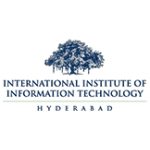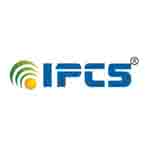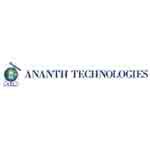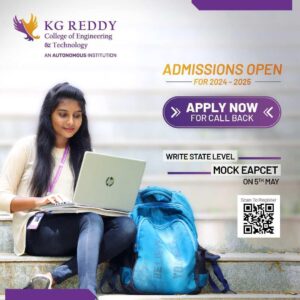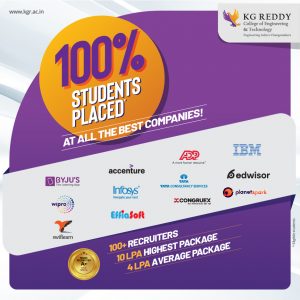The Department of Electronics and Communication Engineering was established in the year 2008 with B. Tech (ECE) and the current intake is 60 students. The significant infrastructural design, well-equipped laboratories & hi-tech computers with high-speed internet facility with all qualified faculty members ensure world-class standard of education delivered from our department.
Over the past two decades, Electronics and Communication engineering has played a pivotal role in improving quality of human life and also contributed to the economic growth of our nation and the world at large. The primary objective of the department is to ensure good academic environment for all the students. The main emphasis is given on the overall development of the students to shape the professional career of the students as technocrat / techno manager. To bridge the gap between curriculum and industry requirement, the students are exposed to practical knowledge.
Electronics and communication engineering is a dynamic and exciting area that provides excellent career opportunities in various areas of technology. The department faculties are committed to teach our students the fundamental concepts and the latest trends via smart teaching and learning process. The students are also taught with critical thinking and problem-solving skills as they accommodate their future with confidence. In addition to classroom teaching, the students are guided and motivated to practically implement the principles learnt in classrooms through experimentations in the laboratories and through innovation centres on Robotics and Internet of Things.
The department of electronics and communication engineering college supports production of in-house kits and we take utmost care that students get more hands-on with self-design and implementation of circuits and projects. Our Electronics Devices and Circuits lab, Analog Circuit Design lab, embedded and Electrical labs are currently equipped with our own designed kits. The department encourages students/researchers to carry out innovative research to match the needs of the technical education system, the industry and our society. The Department has signed MoUs with various organizations to provide live projects for UG in the field of DSP, VLSI, Embedded Systems, and Communication Systems etc. Regular Industrial visits, workshops, internships and mini-projects are organized for students.
Presently, the department of the best ECE college has well-qualified faculty members who have made significant contribution in various fields and have published research papers in reputed journals, international and national conferences. We encourage participation of students in various co-curricular and extra-curricular activities as well.
The students are also given opportunities to involve in IETE Student chapter activities, which help students gain confidence and become skilled engineering professionals. Students are provided internship facility in organizations like BSNL, DRDO, and ECIL etc. The department conducts various workshops, expert talks and additional training programs on recent trends in Electronics and Communication Engineering in collaboration with industries for the benefit of faculty and students. The student projects are conducted in-house with the guidance of department faculty and industrial trainers of the electronics and communication engineering college.
The graduates of the Electronics and Communication Stream have been selected by some of the leading software and hardware companies of the country. The available diversity of expertise of the faculty with the support of the Principal and Management, we prepare the students to work in global multicultural environment.
Welcome to the Department of Electronics & Communication Engineering where we hope you will be able to explore your full potential as a student and eventually make a remarkable mark in your professional life.
Our Vision
- To be recognized as a full-fledged center for learning and research in various fields of Electronics and Communication Engineering through industrial collaboration and to provide consultancy for solving the real time socio-economic problems.
Our Mission
- To provide innovative teaching and learning in the contemporary technologies in Electronics and Communication Engineering to support the professional aspirations of the students.
- To promote innovation through research and development among faculty and students by providing opportunities for inter-disciplinary learning in collaboration with industry.
- To encourage professional development of students that will inculcate ethical values and leadership skills while working with the community to address societal issues.
Program Outcomes(PO’s):
A graduate of the Electronics and Communication Engineering Program will demonstrate:
PO1: Engineering knowledge: Apply the knowledge of mathematics, science, engineering fundamentals, and an engineering specialization to the solution of complex engineering problems.
PO2:Problem analysis: Identify, formulate, review research literature, and analyze complex engineering problems reaching substantiated conclusions using first principles of mathematics, natural sciences, and engineering sciences.
PO3:Design/development of solutions: Design solutions for complex engineering problems and design system components or processes that meet the specified needs with appropriate consideration for the public health and safety, and the cultural, societal, and environmental considerations.
PO4:Conduct investigations of complex problems: Use research-based knowledge and research methods including design of experiments, analysis and interpretation of data, and synthesis of the information to provide valid conclusions.
PO5:Modern tool usage: Create, select, and apply appropriate techniques, resources, and modern engineering and IT tools including prediction and modeling to complex engineering activities with an understanding of the limitations.
PO6:The engineer and society: Apply reasoning informed by the contextual knowledge to assess societal, health, safety, legal and cultural issues and the consequent responsibilities relevant to the professional engineering practice.
PO7: Environment and sustainability: Understand the impact of the professional engineering solutions in societal and environmental contexts, and demonstrate the knowledge of, and need for sustainable development.
PO8:Ethics: Apply ethical principles and commit to professional ethics and responsibilities and norms of the engineering practice.
PO9:Individual and team work: Function effectively as an individual, and as a member or leader in diverse teams, and in multidisciplinary settings.
PO10:Communication: Communicate effectively on complex engineering activities with the engineering community and with society at large, such as, being able to comprehend and write effective reports and design documentation, make effective presentations, and give and receive clear instructions.
PO11:Project management and finance: Demonstrate knowledge and understanding of the engineering and management principles and apply these to one‟s own work, as a member and leader in a team, to manage projects and in multidisciplinary environments.
PO12:Life-long learning: Recognize the need for, and have the preparation and ability to engage in independent and life-long learning in the broadest context of technological change.
Program Educational Objectives(PEO’s):
PEO 1: To be equipped with skills for solving complex real-world problems related to VLSI, Embedded Systems, Signal/Image processing, and Digital and Wireless Communication.
PEO 2: To develop professional skills that will equip them to succeed in their careers and encourage lifelong learning in advanced areas of Electronics and communications and related fields.
PEO 3: To communicate effectively, work collaboratively and exhibit high levels of professionalism, moral and ethical responsibility.
PEO 4: To develop the ability to understand and analyze engineering issues in a broader perspective with ethical responsibility towards sustainable development.
Program Specific Outcome(PSO’s):
PSO1: Identify and apply domain specific tools for design, analysis and synthesis in the areas such as Application Specific Integrated Circuit (ASIC) and System on Chip (SOC) in VLSI domain.
PSO2: Design and implementation of different platform for Embedded Systems and Robotics applications through Internet of Things (IOT).
PSO3: Apply the acquired knowledge and skills in modern communication, signal and image processing systems to meet the present and future needs of industry with optimum solutions.
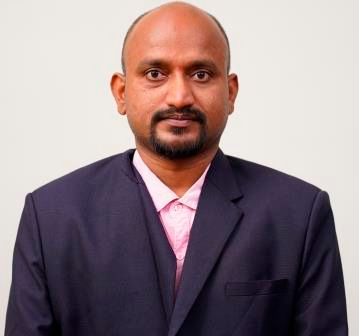
Dr. Angotu Saida
HoD
+91 9951841663
hod.ece@kgr.ac.in
Dr. Angotu Saida is an esteemed Associate Professor and Head of the Electronics and Communication Engineering Department, boasting over 14+ years of dedicated experience in teaching. He obtained his Bachelor’s degree in Electronics and Communication Engineering from SRTIST affiliated to JNTU Hyderabad, and pursued his Master’s degree from KITS, also affiliated to JNTU Hyderabad. He furthered his academic pursuits with a Doctorate in Philosophy from Bhagwant University, Ajmer, Rajasthan, India, specializing in ECE, with a thesis titled “MIMO-Based LTE-Advanced Antenna Design for 5G Communications”. With a scholarly focus, Dr. Saida has contributed significantly to the field, accumulating more than 18 research publications in esteemed international and national journals and conferences. His expertise extends beyond academia; he has served as Officer Incharge of Exams and as a co-convener for the IIC. He led the emerging technology IoT club. Under his associate leadership department of ECE achieved successful NBA accreditation. Furthermore, Dr. Saida has authored a book and two e-book chapters, garnering recognition for his contributions as a reviewer and author. He has been a diligent reviewer for numerous international conferences indexed in Scopus. Dr. Saida is also actively engaged in professional organizations, serving as a member of IEEE, ASTES Journal, IAENG, IFERP, and SDIWC. Committed to lifelong learning, Dr. Saida has augmented his expertise through completion of several NPTEL and Coursera online courses offered by prestigious universities. His multifaceted contributions and commitment to excellence make him a valuable asset to the academic community.
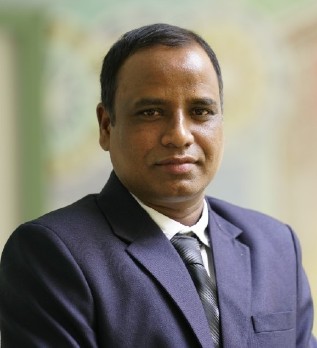
Dr. M N Narsaiah
dean-a@kgr.ac.in
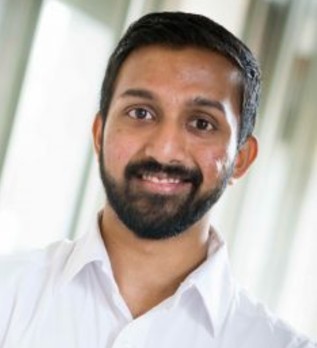
Dr. Rohit Kandakatla
rohit.kandakatla@kgr.ac.in
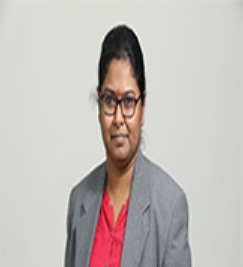
Dr. Manisha G
manishaguduri@kgr.ac.in
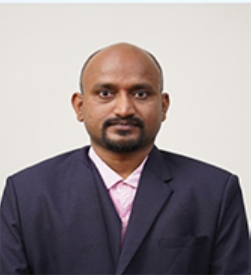
Dr. Angotu Saida
hod.ece@kgr.ac.in
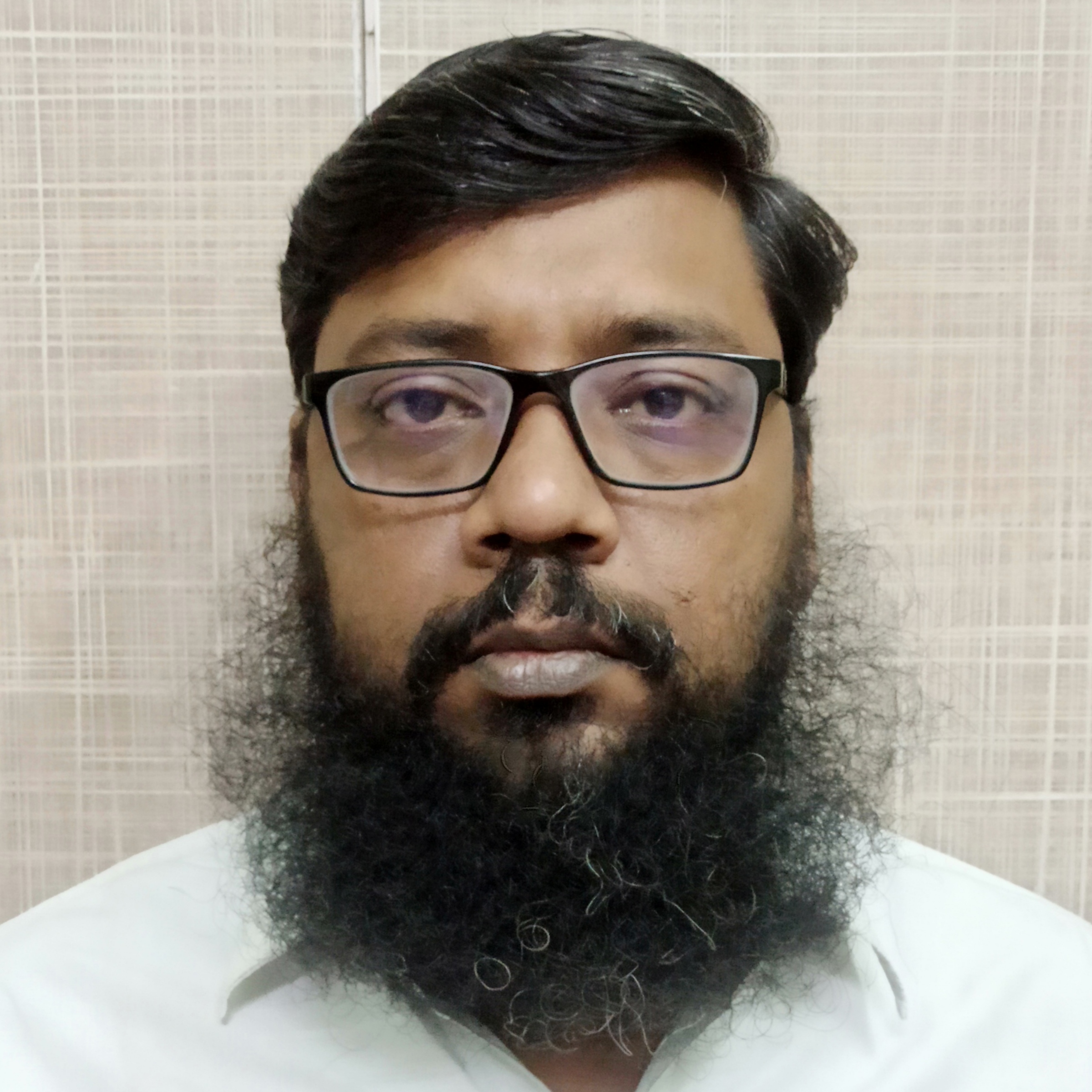
Dr. Mohammad Aleem
aleem.md@kgr.ac.in
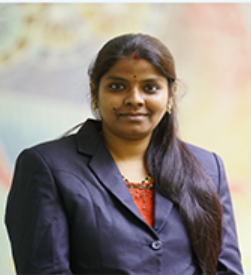
Dr. B. Vandana
vandanarao20@kgr.ac.in
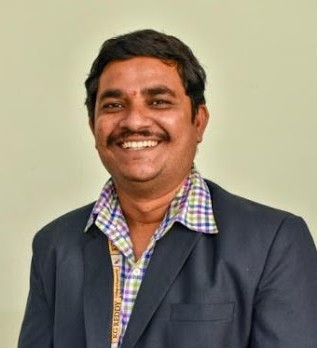
Dr D.Chandraprakash
chandraprakash.d@kgr.ac.in
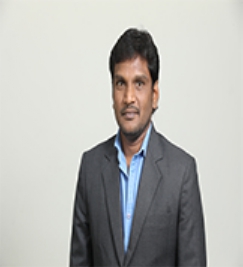
Mr. Anil Kumar Bhupati
anil.bhupathi@gmail.com
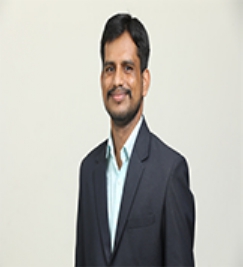
Vijaya Bhasker Reddy
vijayabhasker@kgr.ac.in
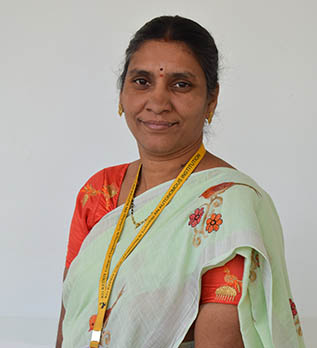
Mrs. K Kalpana
kalpana.akkineni@kgr.ac.in
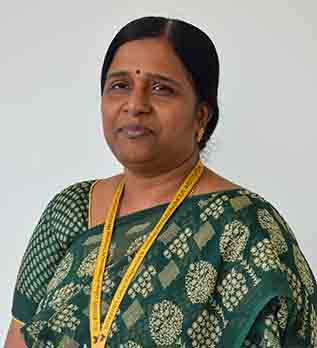
Mrs. G Lakshmi Bhavani
lakshmisrinivas2010@kgr.ac.in
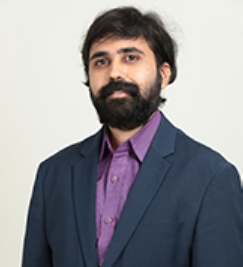
Mr. A. Sai Chander
saichander.a3@kgr.ac.in
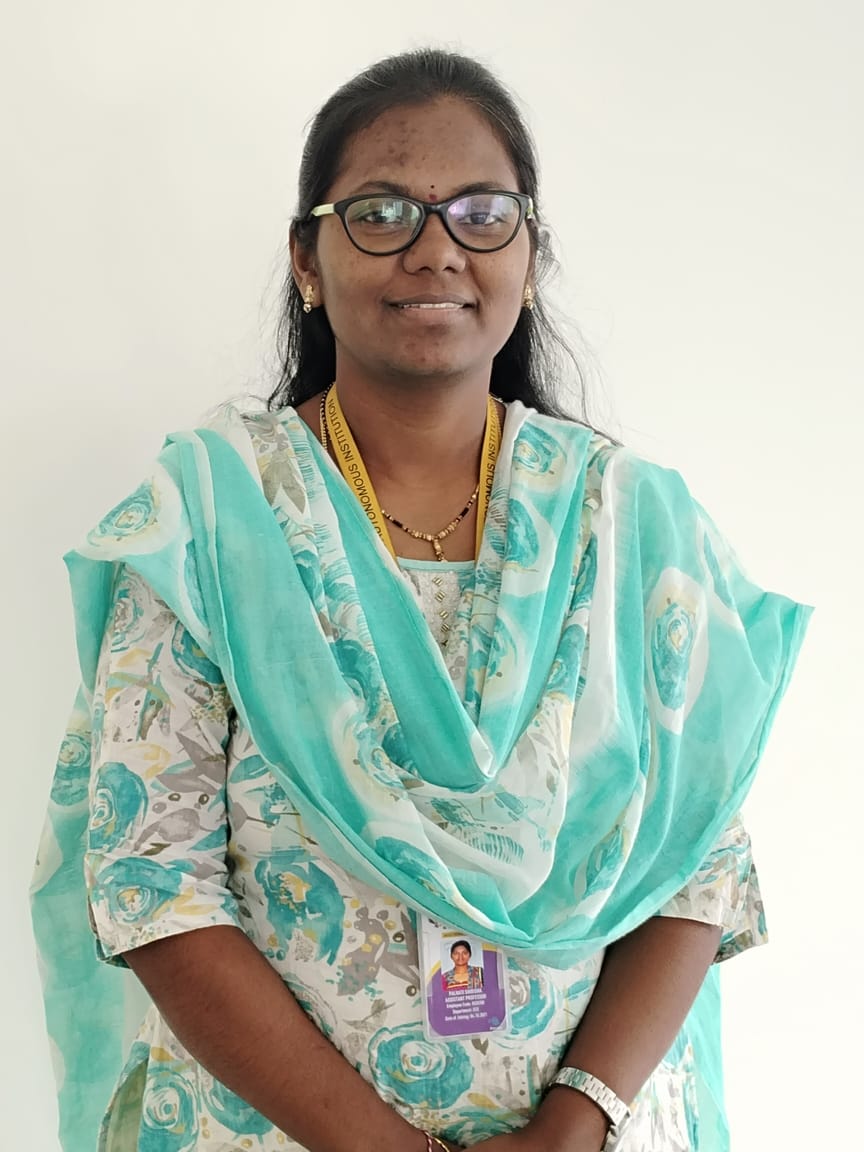
Mrs. Sirisha
sirisha@kgr.ac.in
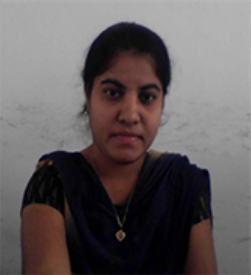
Ms. K Rajani
karnamrajini1996@kgr.ac.in
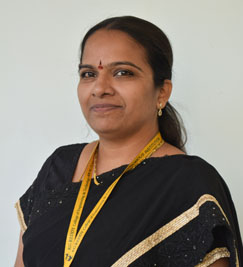
Mrs. Sandhya Tuti
ceed@kgr.ac.in
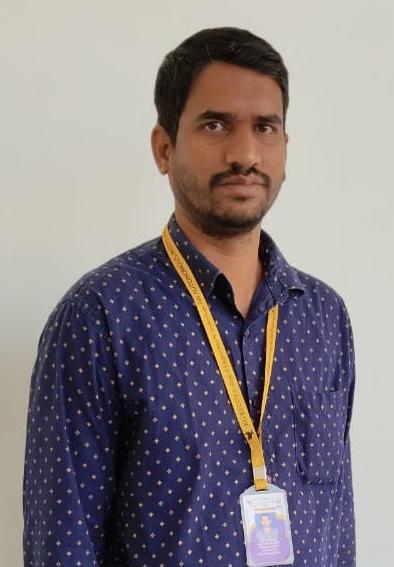
Mr. Shiva Prasad
shivaprasad@kgr.ac.in
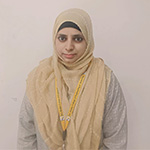
Mrs. Samreen
samreen@kgr.ac.in
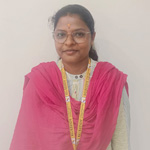
Mrs. N Mounika
mounikanomula@kgr.ac.in
| S. No | Name of Member | Designation | Position |
| 1 | Dr. M. N. Narsaiah | Associate Prof, HOD- ECE | Chairman |
| 2 | Dr. Rohit Kandakatla | Associate Professor, Dept of ECE-ES | Member |
| 3 | Dr. Manisha G | Associate Professor, Dept of ECE-VLSI | Member |
| 4 | Dr. B Vandana | Associate Professor, Dept of ECE-VLSI System Design | Member |
| 5 | Mr. Angotu Saida | Assistant Professor, Dept of ECE- ECE | Member |
| 6 | Mr. Vijaya Bhasker Reddy | Assistant Professor. Dept of ECE-ES | Member |
| 7 | Dr. Aleem Md | Associate Professor, Dept of ECE-ES | Member |
| 8 | Dr. Abhishek Kumar | Associate Professor, Department of Electrical Engineering | Nominated by Academic Council |
| 9 | Dr. Zia Abbas | Associate Professor, Department of ECE | Nominated by Academic Council |
| 10 | Dr. L Pratap Reddy | Professor, Department of ECE | Special Invitee |
| 11 | Mr.. P. Pradeep | TECHDNA, CO-Founder Hyderabad | Nominated by Principal |
| 12 | Mr. G Krishna | Alumni, B .Tech: 2012-16, Embedded System | Nominated by Principal/ HoD |
| 13 | Miss. Bhavani Reddy | Alumni, B .Tech: 2014-18, VLSI | Nominated by Principal/ HoD |
| 14 | Mr. Tanishq | Alumni, B .Tech: 2016-20, Wireless Communication | Nominated by Principal/ HoD |
| 15 | Dr. T Satya Savithri | Professor, Dept of ECE | Nominated by Vice-Chancellor |
| 16 | Mr. A Sai Chander | Associate Professor, Dept of ECE- Communication | Member |
FACULTY ACHIEVEMENTS
List of Faculty Professional Development Activities
Academic Year: 2023-2024
| Sl. No | Name of the Faculty | FDP | STTP | Work shop | Conferences | NPTEL/
Others |
seminars/webinars | Faculty visited the other institutions / universities / industry for professional development | Professional Body Memberships | Awards/Achievements | BoS /Academic Council/EC/GC Members |
| 1. | Dr.RohitKandakatla | 1 | |||||||||
| 2. | Dr. M N Narsaiah | 1 | |||||||||
| 3. | Dr Manisha Guduri | 1 | 1 | ||||||||
| 4. | Dr.Budati Anil Kumar | 1 | |||||||||
| 5. | Dr D Chandra Prakash | 1 | 1 | 1 | |||||||
| 6. | Dr B Vandana | 1 | 1 | 3 | 1 | 1 | 1 | ||||
| 7. | Dr. Md Aleem | 1 | 1 | ||||||||
| 8. | Mr. Angotu Saida | 2 | 1 | 1 | 1 | 1 | 3 | ||||
| 9. | Mrs. Tuti Sandhya | 2 | 1 | ||||||||
| 10. 10 | Mr.VijayaBhasker Reddy | 1 | 1 | 1 | 1 | ||||||
| 11. | Mr. A Sai Chander | 5 | 1 | 2 | 1 | 1 | 1 | 1 | |||
| 12. | Mrs.Lakshmi Bhavani | 4 | 3 | 1 | |||||||
| 13. | Mrs. A. Kalpana | 3 | 1 | 2 | 1 | ||||||
| 14. | Mrs. P Shirisha | 3 | 1 | 1 | 2 | ||||||
| 15. | Miss K Rajini | ||||||||||
| 16. | Mrs. G Deepa | ||||||||||
| 17. | Mr. D Shivaprasad | ||||||||||
| 18. | Mrs. Samreen | 2 | 2 | ||||||||
| 19. | Mrs. Mounika Nomula | 2 | 1 | ||||||||
| Total | 24 | 2 | 12 | 8 | 5 | 3 | 1 | 13 | 61 |
List of Faculty Participated in STTP
Academic Year: 2023-24 Semester: I
| Sl. No | Name of the Faculty | Title of the Activity | Place of the Activity | From Date | To Date |
| 1. | Mr. Angotu Saida | Federated Machine Learning (Healthcare, cloud computing and IoT) | Vardhaman college of Engineering and Technology | 21-11-2023 | 25-1-2023 |
| 2. | Mr.A Sai Chander | Embedded System and 8051 Microcontroller | NITTR, Kolkatta | 24-08-2023 | 04-08-2023 |
List of Faculty Participated in FDP
Academic Year: 2023-24 Semester: I
| Sl. No | Name of the Faculty | Title of the Activity | Place of the Activity | From Date | To Date |
| 1) | Mr. Vijaya Bashkar Reddy | Advanced Electronic System Design-Ideation and Prototyping | Guru Nanak Institutions Technical Campus | 22-12-2023 | 29-12-2023 |
| 2) | Mrs. P. Shirisha | Statistical and Probability Insights for Data Science: Applications and Usecases | Vardhaman College of Engineering and Technology | 6-11-2023 | 10-11-2023 |
| 3) | Mrs.samreen | Statistical and Probability Insights for Data Science: Applications and Usecases | Vardhaman College of Engineering and Technology | 6-11-2023 | 10-11-2023 |
| 4) | Mrs.Mounika Nomula | Statistical and Probability Insights for Data Science: Applications and Usecases | Vardhaman College of Engineering and Technology | 6-11-2023 | 10-11-2023 |
| 5) | Mrs.Lakshmi Bhavani | Statistical and Probability Insights for Data Science: Applications and Usecases | Vardhaman College of Engineering and Technology | 6-11-2023 | 10-11-2023 |
| 6) | Mrs.Kalpana | Statistical and Probability Insights for Data Science: Applications and Usecases | Vardhaman College of Engineering and Technology | 6-11-2023 | 10-11-2023 |
| 7) | Mrs. Nomula Mounika | Innovation and Startup
in Higher Education Institutions |
NITTTR, Kolkata | 30-10-2023 | 03-11-2023 |
| 8) | Mrs. P. Shirisha | Innovation and Startup
in Higher Education Institutions |
NITTTR, Kolkata | 30-10-2023 | 03-11-2023 |
| 9) | Mrs. P. Shirisha | Learning for NLP and Computer Vision | Excelr Raising Excellence | 25-10-2023 | 31-10-2023 |
| 10) | Mrs. A. Kalpana | Learning for NLP and Computer Vision | Excelr Raising Excellence | 25-10-2023 | 31-10-2023 |
| 11) | Mr.Angotu Saida | Recent Trends in Renewable Energy Systems | JSPM’S RAJARSHI SHAHU COLLEGE OF ENGINEERING | 03-10-2023 | 09-10-2023 |
| 12) | Mrs.Dr.B.Vandana | Virtual Labs | PALS VLAB | 26-09-2023 | 29-09-2023 |
| 13) | Mr.A. Sai Chander | Virtual Labs | PALS VLAB | 26-09-2023 | 29-09-2023 |
| 14) | Mr.A Sai Chander | Fundamentals of Machine Learning and Deep Learning | NITTTR, Kolkata | 25-09-2023 | 29-09-2023 |
| 15) | Mrs.G. Lakshmi Bhavani | Fundamentals of Machine Learning and Deep Learning | NITTTR, Kolkata | 25-09-2023 | 29-09-2023 |
| 16) | Mrs. A. Kalpana | Fundamentals of Machine Learning and Deep Learning | NITTTR, Kolkata | 25-09-2023 | 29-09-2023 |
| 17) | Mr. Saida Angotu | Innovation Methods in VLSI Designs using A and ML | MLR Institution of Technology | 24-8-2023 | 30-8-2023 |
| 18) | Mr.A Sai Chander | 8085 Microprocessor | NITTTR, Kolkata | 14-0802023 | 18-08-2023 |
| 19) | Mrs.G. Lakshmi Bhavani | Air, Water Pollution and Health | NITTTR, Kolkata | 31-07-2023 | 4-08-2023 |
| 20) | Mr.A Sai Chander | Air, Water Pollution and Health | NITTTR, Kolkata | 31-07-2023 | 4-08-2023 |
| 21) | Mrs.Samreen | Air, Water Pollution and Health | NITTTR, Kolkata | 31-07-2023 | 4-08-2023 |
| 22) | Mrs.G. Lakshmi Bhavani | Pedagogy and Technology enabled Learning | IIT Jodhpur | 19-07-2023 | 23-0702023
|
| 23) | Mr. A Sai Chander | Fundamental of Wireless Communication | GITAM (Deemed to be University), Vishakhapatnam | 26-06-2023 | 30-06-2023 |
List of WORKSHOPS
Academic year: 2023-24 Semester: I
| Sl. No | Name of the Faculty | Title of the Activity | Place of the Activity | From Date | To Date |
| 1. | Dr. Vandana Rao | Proposal Writing | PALS | 18-12-2023 | 18-12-2023 |
| 2. | Mrs.Palnati Shrisha | Happiness is an Inside Activity | (CEED) KG Reddy college of engineering and Technology | 05-10-2023 | 05-10-2023 |
| 3. | Mrs.Samreen | Happiness is an Inside Activity | (CEED) KG Reddy college of engineering and Technology | 05-10-2023 | 05-10-2023 |
| 4. | Mrs.G. Lakshmi Bhavani | Happiness is an Inside Activity | (CEED) KG Reddy college of engineering and Technology | 05-10-2023 | 05-10-2023 |
| 5. | Mrs. G Lakshmi Bhavani | Analog, Digital and Mixed Signal IC Design Flow with case Studies using NG SPICE/LT Spice | The Institution of Electronics and Telecommunication Engineers | 12-08-2023 | 13-08-2023 |
| 6. | Mrs.Tuti Sandhya | Teaching Problem Solving Using C | Education Society Chapter | 03-08-2023 | 07-08-2023 |
| 7. | Mrs. Nomula Mounika | Implementation of Student- centred Learning in Engineering Classrooms | Kg Reddy college of engineering and Technology (CEED) | 24-07-2023 | 28-07-2023 |
| 8. | Mr.Dr. Aleem Mohammed | Implementation of Student- centred Learning in Engineering Classrooms | Kg Reddy college of engineering and Technology (CEED) | 24-07-2023 | 28-07-2023 |
| 9. | Mrs. Tuti Sandhya | Implementation of Student- centred Learning in Engineering Classrooms | Kg Reddy college of engineering and Technology (CEED) | 24-07-2023 | 28-07-2023 |
| 10. | Mrs. Samreen | Implementation of Student- centred Learning in Engineering Classrooms | Kg Reddy college of engineering and Technology (CEED) | 24-07-2023 | 28-07-2023 |
| 11. | Mrs. G. Lakshmi Bhavani | Implementation of Student- centred Learning in Engineering Classrooms | Kg Reddy college of engineering and Technology (CEED) | 24-07-2023 | 28-07-2023 |
| 12. | Mr.Angotu Saida | Design and Analysis of Microwave Antennas | Vardhaman college of Engineering and Technology | 26-6-2023 | 1-7-2023 |
Seminars/Webinars
Academic Year: 2023-24 Semester: I
| Sl. No | Name of the Faculty | Title of the Activity | Place of the Activity | Type of Activity | From Date | To Date |
| 1. | Mrs.Palnati Shrisha | 21st Century Educator and Learner:Clossing the Gap | (CEED), KG Reddy college of Engineering and Technology | Seminar | 12-10-2023 | 12-10-2023 |
| 2. | Mrs. Palnati Shirisha | Mentoring skills | (CEED), KG Reddy college of engineering and Technology | Seminar | 14-09-2023 | 14-09-2023 |
| 3. | Mr.A.Sai Chander | Scope of 5G Communication | Rajalakshmi Engineering College | Seminar | 19-08-2023 |
List of Online Courses
Academic Year: 2022-23
| Sl. No | Name of the Faculty | Title of the Activity | Type of Activity | From Date | To Date |
| 1 | Mr. A. Sai Chander | An Introduction to Coding Theory | NPTEL | July 2023 | September 2023 |
| 2 | Dr. D. Chandra Prakash | An Introduction to Coding Theory | NPTEL | July 2023 | September 2023 |
| 3 | Mrs. A. Kalpana | System Design Through Verilog | NPTEL | July 2023 | September 2023 |
| Mrs. Shirisha P | System Design Through Verilog | NPTEL | July 2023 | September 2023 | |
| 4 | Mr. Vijaya Bhasker Reddy | Machine Learning and Deep Learning-Fundamentals and Applicationa | NPTEL | July 2023 | October 2023 |
| 5 | Mrs. A. Kalpana | Introduction to Internet of things | NPTEL | July 2023 | October2023 |
List of Faculty Participated in Conference
Academic Year: 2023-24 Semester: I
| Sl. No | Name of the Faculty | Title of the Activity | Place of the Activity | From Date | To Date |
| 1. | Mr. A Sai Chander | Review on Accident Prevention System at Hairpin Band Roads | Gokaraju Rangaraju Institute of Engineering and Technology | 30-11-2023 | 2-12-2023 |
| 2. | Mrs. A Kalpana | Counterfict Notes detector Using Structural similarity Index score | Gokaraju Rangaraju Institute of Engineering and Technology | 30-11-2023 | 2-12-2023 |
| 3. . | Dr. B Vandana Rao | Exploring the Dog Bread Prediction Mechanisum using Convolution Neural Networks | 5th International Conference on Design and Manufacturing | 30-11-2023 | 1-12-2023 |
| 4. | Mr. Saida Angotu | IoT Based Traffic Light Control System with Ambulance Designation | Raj Kumar Goel Institute of Technology | 23-11-2023 | 24-11-2023 |
| 5. | Mr. A Sai Chander | The First International Conference on Cyber Physical, Power Electronics and Electric Vehicles | KG Reddy College of Engineering and Technology | 28-09-2023 | 30-09-2023 |
| 6. | Mr. Vijaya Bashkar Reddy | Cloud Based Attendence Management System using Face Recognition with Haar Cascade Classifier and CNN | Anurag University, Hyderabad | 25-0 8-2023 | 26-08-2023 |
| 7. | Dr. B Vandana Rao | Low Power Performance Analysis of 16-Bit Vedic Math RISC Processor | 3rd Asian Conference on Innovation in Technology (ASIANCON) | 25-08-2023 | 27-0802923 |
| 8. | Dr. B Vandana Rao | Vehicle to Grid Technology: EV power Generation Analysis through Plug in Charging Method | 3rd International Conference on Intelligent Technologies | 23-06-2023 | 25-06-2023 |
Faculty Professional Body Membership
Academic Year: 2023-24 Semester: I
| Sl. No | Name of the faculty | Qulification | Designation | Name of the Membership Body | Name of the Membership Body | Name of the Membership Body(NUMBER) | IEEE |
| 1 | Dr Rohit Kandakatla | Ph.D | AssociateProfessor | ||||
| 2 | Dr. M N Narsaiah | Ph.D | AssociateProfessor(HOD) | IAENG(253643) | IEEE(98511600) | ||
| 3 | Dr. Manisha G | Ph.D | AssociateProfessor | IEEE(93262232) | |||
| 4 | Dr. B Vandana Rao | Ph.D | AssociateProfessor | IEEE(92531294) | |||
| 5 | Dr. D. Chandra Prakash | Ph.D | AssociateProfessor | IETE(M-502752) | IAENG(253660) | IEEE(98475533) | |
| 6 | Dr. Meher Abhinav | Ph.D | AssistantProfessor | ||||
| 7 | Mr. Angotu Saida | M,Tech(Ph.D) | AssistantProfessor | IFERP(PMIN82039456) | IAENG(253664) | SDIWC(27239) | IEEE(98496104) |
| 8 | Mr. Vijaya Bhasker Reddy | M,Tech(Ph.D) | AssistantProfessor | IEEE(98495956) | IAENG | ||
| 9 | Mr. D Lakshminarayana | M,Tech(Ph.D) | AssistantProfessor | IAENG(253697) | |||
| 10 | Mrs. P Shirisha | M,Tech | AssistantProfessor | ||||
| 11 | Mrs. A Kalpana | M,Tech | AssistantProfessor | IAENG(312513) | IEEE(98475688) | ||
| 12 | Mr. A Sai Chander | M,Tech | AssistantProfessor | IEEE(98526384) | SIPH(2023045) | ||
| 13 | Mrs.G. Laksmi Bhavani | M,Tech | AssistantProfessor | IAENG(312514) | |||
| 14 | Mr. Anil Kumar Bhupati | M,Tech | AssistantProfessor | ||||
| 15 | Miss. Karanam Rajini | M,Tech | AssistantProfessor | IAENG(312520) | IEEE(98475621) | ||
| 16 | Miss. Enikirala Sindhu | M,Tech | AssistantProfessor | ||||
| 17 | Mr. R. Sathisih Kumar | M,Tech | AssistantProfessor | ISTE(LM67843) | IAENG(294809) | ISRD(M4150905784) | |
| 18 | Mr. B. Anil Kumar | Phd | Associate Professor | IEEE(92653002) |
The list of faculties who received awards and achievements
Academic Year: 2023-24 Semester: I
| Sl. No | Name of the Faculty | Title of the Activity | Place of the Activity | From Date | To Date |
| 1. | Mr.Sai Chander | Best Teacher | SIPH Publications | 2023 | Till Date |
| 2. | Mr.A Saida | A State Level Technical Fest,IKARUS 2023 | KG Reddy college of Engineering and Technology | 4-12-2023 | 5-12-2023 |
| 3. | Dr. B Vandana Rao | Session Chair | 5th International Conference on Design and Manufacturing | 30-11-2023 | 1-12-2023 |
| 4. | Mr.A Saida | Reviwer | Raj Kumar Goel Institute of Technology | 24-11-2023 | 24-11-2023 |
| 5. | Mr.A Saida | Best Researcher Award | Knowledge Research Cacademy | 29-10-2023 | 29-10-2023 |
| 6. | Dr. Manisha Guduri | Reviewer | IEEE Gujarat Section at Marwadi University, Rajkot | 16-10-2023 | 18-10-2023 |
Faculty visited the other Institutions / Universities / Industry for professional development
Academic Year: 2022-23
| Sl. No | Name of the Faculty | Title of the Activity | Place of the Activity | Type of Activity | From Date | To Date |
| 1 | Mrs.Dr.B.Vandana Rao | Partner Institute | PALS | Partner Institute | 17-10-2023 | 17-10-2023 |
2021-2022
| S.No | Name of the Faculty | Title of Activity | Place of the Activity |
| 1 | Dr. Manisha G | Technical Programme Committee (TPC) Member | Organized by BVICAM, New Delhi |
| 2 | Dr. B Vandana Rao | Innovate 4 Menstrual Waste Hackathan 2002 | Innovate 4 Menstrual Waste Hackathan 2002 |
| 3 | Dr. B Vandana Rao | Innovate 4 Menstrual Waste Hackathan 2002 | Innovate 4 Menstrual Waste Hackathan 2002 |
| 4 | Dr. Meher Abhinav | FICTA2022 conference as a PC member | FICTA2022 program committee |
| 5 | Dr. Meher Abhinav | ICECET’22 Organizing Committee member | International Conference on Electrical, Computer and Enerty Technologies (ICECET2022) |
| 6 | Mrs. Tuti Sandhya | IUCEE ANNUAL LEADERSHIP SUMMIT 2022 | International Center Goa, India |
| 7 | Mrs. Tuti Sandhya | IEEE ENVISION 2022 | Vardhaman College of Engineering |
| 8 | Dr. Manisha G | AECE-2022 Research paper reviewer | Organized by Department of ECE, R.K.G.I.T, Ghaziabad, U.P, India. |
| 9 | Mr. Angotu Saida | AECE-2022 Research paper reviewer | Organized by Department of ECE, R.K.G.I.T, Ghaziabad, U.P.,India |
| 10 | Dr. Rohith Kandakatla | Associate Editor | Journal for Engineering Education Transformations |
| 11 | Mrs. Tuti Sandhya | ICL 2022 Paper Reviewer | 25th International Conference on Interactive Collaborative Learning |
| 12 | Mrs. Tuti Sandhya | WEEF 2022 Paper Reviewer | WEEF & GEDC Conference 2022 |
NPTEL Course certified Faculty
| Faculty Name | Course & Certificate |
| Mr. Vijay Bhaskar Reddy | Digital Circuits |
| Mr. Vijay Bhaskar Reddy | Sensors and actuators |
| Mrs. A Deepika | Digital Image Processing |
| Mr. Bavu Saheb | Digital Circuits |
| Academic Year | No. of Faculty Publications |
|---|---|
| 2018-2019 | 23 |
| 2017-2018 | 30 |
| 2016-2017 | 14 |
| 2015-2016 | 9 |
| 2014-2015 | 5 |
- A siada Certified in Python 3.4.3 from Spoken Tutorial- KGRCET.
- A Saida Awarded – Fourth International Conference on Transformations in Engineering Education.
- A.Deepika acted as a Reviewer in Fourth International Conference On Transformations in Engineering Education (ICTIEE-2017).
- P.USHA, successfully completed “IUCEE EPICS Design thinking course”
- A.Deepika, successfully completed “IUCEE EPICS Design thinking course”
- P.USHA acted as a Reviewer in Fourth International Conference On Transformations in Engineering Education (ICTIEE-2017).
- P.USHA acted as a Reviewer in Fifth International Conference On Transformations in Engineering Education (ICTIEE-2018).
- Priyanka Thakur, successfully completed NPTEL online course on “MEDICAL IMAGE ANALYSIS”
- Bavusaheb B.K is an active review member in JETIR(Jounal of Emerging Technologies and Innovative Research)
- Bavusaheb B.K filed three PATENTS.
- P.USHA, got certification of Appreciation from Texas Instrumentation for participating in DrishTI online Contest on 28.10.2017.
- P.USHA,Got appreciation certificate from The Institution of Electronics and Telecommunication Engineers(IETE) for organizing a competition on “Robotics and its Applications”
- P.USHA,Got appreciation certificate from MAVEN SILICON, Bangalore for being organizer of the workshop on “VLSI Design Using Verilog HDL”.
- P.USHA,Got appreciation certificate from The Institution of Electronics and Telecommunication Engineers(IETE) for organizing a Essay writing competition on “The Role of Artificial Intelligence and Machine Learning in the Development of Society”
- Dr.Pravin R Kshirsagar,Got appreciation certificate from MAVEN SILICON, Bangalore for being organizer of the workshop on “VLSI Design Using Verilog HDL”.
- Poonam Swami, participated in Unnat Bharath Abhiyan from 26/8/19 to 28/8/19.
- Poonam Swami, participated in state level camp from 30/8/19 to 5/9/19.
- Poonam Swami, participated in Golden Jubilee celebration on 26/9/19 at CMR College
- Poonam Swami, participated in Gandhi Jayanthi celebration organized at JNTUH
- T.Gayatri, Got topper position in Research Methodology
- D,Chandraprakash,Got appreciation certificate from The Institution of Electronics and Telecommunication Engineers(IETE) for organizing a Essay writing competition on “The Role of Artificial Intelligence and Machine Learning in the Development of Society”
- M.N.Narsaiah published a paper in SCOPUS on “Dual filter image fuses algorithm for CT & MRI Medical image”
- D.Chandraprakash published a paper in ADLYA on “Radiation and chemical reaction MHD accelerated inclined state with variable temperature”
- A Deepika, successfully completed NPTEL online course on “DIGITAL IMAGE PROCESSING”
- Dr.B.Vandana Rao, received convener certificate from Institute Innovation Council(IIC)
- Md.Asif, Successfully Completed Industrial training course on “RAPID PROTOTYPING using ARM Mbed” from Eduvance under ARM University Program.
Student Achievements
- Mamidi Charan kumar got certificate of merit in poster making competiton on world students day conducted at Hyderabad
- B Manikyam & E Shravan Kumar received certificate of merit in fun blast competition on world students day conducted at Hyderabad
- A Preethi & Siddartha Reddy received certificate of merit in JAM competition on world students day conducted at Hyderabad
- Pattan Shahnawaz Ahmed Khan got certificate of Achievement in Python Programming conducted at Khargpur on 16/02/2022
- Hasitha Yadavalli received certificate of appreciation in Computing, Communication and Sensor Networks at Odisa on 24/09/2022
- Anuradha Shankar, Arjun Singh published a research paper in IJERT Volume-3, Issue-03, March-2014 on “Design and implementation of high speed and low power multiplier using urdhwa tiryagbhyam sutra”.
- B. Pavan Kumar, A. Bhagyaraj, D. Sushil, G. Vikram Reddy has published a paper in IJCRT on “Implementation of safe heart for monitoring patient condition”.
- 45 final year students successfully completed Oracle Academy Java Fundamentals.
- 15 Students of ECE department have participated in Oscad training.
- 8 Students of ECE department have successfully completed the requirements to be recognized as a Microsoft Technology Associate.
- 1 Student successfully completed “Global innovation and entrepreneurship program “ organized by University of Massachusetts(USA) and KLE Technological University Hubli, India.
- 47 students of ECE Department have participated in an Online Contest conducted on 28TH Oct,2017 by Texas Instruments India.
- 6 students of KGRCET are selected in IBC HACK-2018.
- Jyothirmay barua and K.V.Subba reddy project has been shortlisted in investor connect session held at E-SUMMIT HYDERABAD hosted by vardhaman college of Engineering on 21st and 22nd Aug,2018.
- K.V.Subba reddy appointed as a intershala student partner (ISP) by internshala from 19/9/2018 to 15/11/2018.
- 4 students have successfully completed VLSI design using verilog HDL- webinar
- 3 students participated in state level NSS Camp
- 2 students got rank selection for state NSS conducted at CMR college of Engineering and Technology
Program Assessment Committee (PAC)
| S. No | Name of faculty | Designation | Position | Parent organization | Signature |
| 1. | Dr. M.N. Narsaiah | HOD | Chairman | KGRCET | |
| 2. | Mr. A. Vijaya Bhasker Reddy | Assistant professor | Coordinator | KGRCET | |
| 3. | Mrs. K. Kalpana | Assistant professor | Member (IV-Module Coordinator) | KGRCET | |
| 4. | Mr. A. Sai Chander | Assistant professor | Member (III-Module Coordinator) | KGRCET | |
| 5. | Mrs. N Mounika | Assistant professor | Member (II-Module Coordinator) | KGRCET |
Department Development Committee (DDC)
| Sl. No | Name of faculty | Position | Responsibility | Signature |
| 1. | Dr. M N Narsaiah | Chairman | Overall Implementation | |
| 2. | Mr. Angotu Saida | Coordinator | Monitoring of overall activities and IIC activities | |
| 3. | Dr Rohit Kandakatla | Member | Advisor | |
| 4. | Dr D. Chandra Prakash | Member (DSA) | Extra-curricular Activities | |
| 5. | Dr. G. Manisha | Member | Research activities | |
| 6. | Dr. Aleem Md | Member (F C) & BoS) | Curriculum Design & Communication Coordinator | |
| 7. | Mr. A Sai Chander | Member (T&P) | Placements & Laboratories | |
| 8. | Dr B Vandana | Member (PRC & CRID) | Project & Research Activities | |
| 9. | Mrs. A. Kalpana | Member (Examination) | Examination related activities | |
| 10. | Mr. Vijaya Bhasker Reddy | Member (IQAC & PAC) | Accreditation activities & OBE Implementation | |
| 11. | Mrs. T. Sandya | Member | CIST | |
| 12. | Mrs. G. Lakshmi Bhavani | Member (CEED) | Teaching-Learning Process | |
| 13. | Mr D Shiva Prasad | Member | Academic activities | |
| 14. | Mrs. Samreen | Member | Admin Files. | |
| 15 | Mrs. N Mounika | Member | Co -curricular Activities |
Finance Committee (FC)
| S. No | Name of the faculty | Position | Responsibilities | Signature |
| 1. | Dr. M.N Narsaiah | Chairman | ||
| 2. | Dr. Md. Aleem | Coordinator | Budget and Expenditure Preparation | |
| 3. | Mr. A. Vijaya Bhasker Reddy | Member | Laboratory equipment, Software and Consumables | |
| 4. | Dr. D Chandra Prakash | Member | R&D, Training and Travel | |
| 5. | Mr. A. Sai Chander | Member | Maitainence and spares |
Project Review Committee (PRC)
| Sl. No | Name of the Faculty | Designation | Position |
| 1 | Dr. M. N. Narsaiah | Associate Professor | Chairman |
| 2 | Dr. B. Vandana | Associate Professor | Coordinator |
| 3 | Dr. Md. Aleem | Associate Professor | Member |
| 4 | Mrs. T. Sandya | Assistant Professor | Member |
| 5 | Mrs. G. Lakshmi Bhavani | Assistant Professor | Member |
Laboratories :
- Analog communication(AC) Laboratory
- Analog Electronics(AE)Laboratory
- Basic simulation(BS) laboratory
- Computer Organization(CO) laboratory
- Digital Communication(DC) Laboratory
- Digital IC Applications(DICA) Laboratory
- Digital signal processing(DSP) laboratory
- Digital System Design(DSD) Laboratory
- Electronic devices and circuits(EDC) Laboratory
- Linear IC Applications(LICA) Laboratory
- Microprocessors and microcontrollers(MPMC) laboratory
- Microwave(MW) Laboratory
- Pulse and Digital Circuits(PDC) Laboratory
Industry supported Laboratories:
- Internet of Things (IOT) Lab
- Research Lab
Certificate Course
Electronics and Communication Engineering (ECE) compiles in Communication Engineering and core Electronics Engineering. The certificate course concept is to focus mainly on the communication part with the knowledge of the electronics field. Electronics and Communication Engineering deal with the electronic devices and software applications. It is an interface of chip level hardware and information technology. The students go through the core study of communication such as design, digital electronics, fundamental of Electronics engineering, signal & circuit, electronic circuits, VLSI, power electronics, computer architecture and control systems. Based on above core courses, department provide certificate course to all students to enhance their knowledge to reach the optimum level of ongoing electronics technology in market or industry.
Objective of Certificate Course
It aims to deepen the knowledge and skills of the students on the basic concepts and theories that will equip them in their professional work involving analysis, systems implementation, operation, production, and maintenance of the various applications in the field of Electronics and Communications Engineering.
Scope of the Course
After completion of certificate course at this ECE engineering college, student can able to make their future carrier as their interest. An electronics and communication engineer can work in aviation and avionics, consumer electronics, electricity plant, manufacturing, transportation, communication & telecommunication, computer application, radio & television, diagnostic equipment manufacturing and offshore companies.
| Course Name | Duration of the Course | No. of Students Attended | No. of Students Appeared Examination | No. of Students Passed | Academic Year |
|---|---|---|---|---|---|
| Ten Week Foundation Course on IoT | 28.04.2023 to 30.06.2023 | 25 | 25 | 25 | 2022-23 |
| Ten Week Foundation Course on IoT Certificate | 02.12.2022 to 10.02.2023 | 25 | 25 | 25 | 2022-23 |
| Embedded systems (8086, Intel, Pentium Processor and Controllers) | 15.11.2022 to 31.01.2023 | 32 | 32 | 32 | 2022-23 |
| VLSI(Verilog Coding) | 15.11.2022 to 01.02.2023 | 28 | 28 | 28 | 2022-23 |
| VLSI | 14.03.2023 to 21.07.2023 | 28 | 28 | 28 | 2022-23 |
| Embedded Systems | 14.03.2023 to 21.07.2023 | 31 | 31 | 31 | 2022-23 |
| IOT-Certification Programme | 18.12.2021 to 14.05.2022 | 33 | 33 | 33 | 2021-22 |
| Advanced Course on IOT | 18.06.2022 to 06.08.2022 | 35 | 35 | 35 | 2021-22 |
| Foundational Course on IOT | 22.01.2022 to 26.02.2022 | 35 | 35 | 35 | 2021-22 |
| Foundational Course on IOT | 26.02.2021 to 19.03.2021 | 19 | 19 | 19 | 2020-21 |
| Advanced Course on IOT | 09.06.2021 to 1.07.2021 | 18 | 18 | 18 | 2020-21 |
| Python Programming | August 2019 to October 2019 | 38 | 38 | 38 | 2019-20 |
| IOT using ARDUNIO | 25-09-18 to 29-09-18 |
38 | 38 | 38 | 2018-19 |
| PCB design and Fabrication | 17-09-18 to 21-09-18 |
52 | 52 | 52 | 2018-19 |
| PCB design and Fabrication | 11-09-17 to 15-09-17 |
37 | 37 | 37 | 2017-18 |
| IOT using ARDUNIO | 04-09-17 to 08-09-17 |
43 | 43 | 43 | 2017-18 |
Value Added Course
The KG Reddy Electronic and Communication Engineering College has entered into MoU with many leading companies to organize value added courses to students, to take up specialized courses, which are currently being used in the industry. These courses are not taught under the regular curricula to the level expected by the industry. These courses are imparted at a free of cost rate and the trainers used to wake use of the systems and equipment’s of the College.
Objective of Value-Added Courses
Emerging trends in technical and professional education call for value added course i.e. students must acquire something more than what is provided in the curriculum. There is need to enhance their communication skills, to develop professional ethics in them and to help them learn and develop human values and concern for humanity. This course helps to acquire the several technical electronics skills to achieve their different goals in life.
Scope of Value-Added Courses
This course has several scopes for student career which are given below. Electronics is now part of our everyday life, from the mobile phones to televisions, computers and even the high-end advanced satellites that are helping us to lead a smooth life. Ever since the evolution of technology, Electronics and Communication has become an essential discipline which is required by all the industries. Hence, Electronics and Communication engineering is one of the most sought-after branches by students. Electronics and Communication Engineering has also penetrated into other areas like healthcare, instrumentation, automation, remote sensing, signal processing etc. So, students pursuing electronics and communication engineering have a lot of scope in varied industries. Taking the educational scope and career choices into consideration, here are the popular areas of study in the field of Electronics and Communication.
| S.No | Course Name | Duration of the Course | No. of Students Attended | Academic Year |
|---|---|---|---|---|
| 1 | Campus Recruitment Training Program | 13-02-2023 to 21-06-2023 | 54 | 2022-23 |
| 2 | Campus Recruitment Training (TCS NQT) | 30-05-2023 t0 03-06-2023 | 59 | 2022-23 |
| 3 | Campus Recruitment Training Aptitude | 26-04-2023 t0 08-07-2023 | 59 | 2022-23 |
| 4 | Campus Recruitment Training Program | 02-11-2022 to 08-02-2023 | 56 | 2022-23 |
| 5 | Campus Recruitment Training Program | 06-09-2022 to 10-01-2023 | 54 | 2022-23 |
| 6 | Special Aptitude Training | 29-05-2023 t0 04-06-2023 | 54 | 2022-23 |
| 7 | Campus Recruitment Training Program II ECE | 30-03-22 to 27-07-22 |
56 | 2021-22 |
| 8 | Campus Recruitment Training Program III ECE-A | 08-03-22 to 21-06-22 |
44 | 2021-22 |
| 9 | Campus Recruitment Training Program III ECE-B | 08-03-22 to 21-06-22 |
45 | 2021-22 |
| 10 | Campus Recruitment Training Program Technical IV ECE | 28-12-21 to 07-01-2 |
108 | 2021-22 |
| 11 | Campus Recruitment Training Program Aptitude IV ECE | 28-12-21 to 07-01-2 |
108 | 2021-22 |
| 12 | Machine Learning Using Python Programming | 10-11-19 to 15-11-19 |
33 | 2019-20 |
| 13 | Digital Design using Verilog | 19-02-19 to 23-02-19 |
54 | 2018-19 |
| 14 | Oracle Database Programming | 22-10-18 to 26-10-18 |
37 | 2017-18 |
| 15 | Digital Design using Verilog | 12-03-18 to 16-03-18 |
31 | 2017-18 |
| 16 | Oracle Database | 12-08-17 to 16-08-17 |
43 | 2017-18 |
Internship Details
| Academic year | Internship details |
|---|---|
| 2022-23 | Internship_22-23_ECE |
| 2021-22 | Internship_21-22_ECE |
| 2020-21 | Internship_20-21_ECE |
| 2019 -20 | Internship_19-20_ECE |
| 2018 -19 | Internship_18-19_ECE |
Best Practice-I
Value added and Certification courses
Certification courses are organized based on the survey conducted for II and III year student in the various domains of Electronics and Communication Engineering such as VLSI, Embedded System and Communication systems. We identify and collaborate with different reputed academic institutions and industries that support the students technically in this practice.
Self-directed learning: Opportunity is provided for the students to choose the area of interest they would like to work in future, this learning promotes confidence and strong student ownership of courses.
Relevance: Students are motivated to get trained and work on the core domain of ECE that include the different courses they study during the graduation.
Skills development: Students learn through hands-on, experimental and problem-based approaches to learning. Skills development takes place in this practice; they are explored to the modern tools in different domain of Electronics and Communication Engineering.
Collaboration: We identify and collaborate with different reputed academic institutions and industries that support the students technically in this practice. Students often work in groups, learning to be both tutors and learners while building social and collaborative skills.
Solving problems: Based on the knowledge gained by the student through these certification courses, they identify the problem and solve them with different technologies by doing the projects
Future: After completing the three certification courses in consequent semester starting from second year first semester, students add this co-curricular activity for their personal CV and ready for the industry in the chosen domain.
Best Practice-II
Project based Assignments (PBA)
Department of ECE has a best practice of implementing projects based assignments for the II and III year students. Instead of writing assignments students learn core concepts by while doing in this practice. Students get following benefits by participating in PBAs:
Self-directed learning: Students identify the subject matter to be investigated; self-directed learning promotes confidence and strong student ownership of their projects and results.
Relevance: Students are motivated by the opportunity to select local or global topics of relevance/interest to them, and develop their own scientific investigations and models engaging locally or globally.
Skills development: Students learn through hands-on, experimental and problem-based approaches to learning. Skills development takes place in this practice includes research methodologies, design of experiment, data collection, evaluation and analysis, critical thinking, problem solving, communications, innovation and entrepreneurship.
Collaboration: Students often work in groups, learning to be both tutors and learners while building social and collaborative skills.
Solving global grand challenges: Project based learning is a great way to connect learning in the classroom to the external world and the global grand challenges of food, water and energy security, better health services and better infrastructure.
Future: Looking to the future it is a brilliant co-curricular activity for students to add to their personal CV and it shows a real passion for science and an ability to think for oneself.
Faculty Publications
Patents Published
Funding Grants
Academic Year 2019-23
| S.NO | Enrolment No | Name of the Student | Name of the Company |
| 1 | 19QM1A0428 | SAI PRIYA | IBC Media |
| 2 | 20QM5A0402 | VIJAY REDDY | Shreshta Infotech Solutions |
| 3 | 19QM1A0402 | AJELERA YASWANTH KUMAR | SPR Technologies |
| 4 | 19QM1A0403 | ALAM MADHU SHALINI | Intellipat |
| 5 | 19QM1A0404 | A. SATHIVIKA REDDY | SPR Technologies |
| 6 | 19QM1A0411 | C ROSHINI | Shreshta Infotech Solutions |
| 7 | 19QM1A0406 | BHUMISHA | Caldron Technologies |
| 8 | 19QM1A0414 | C.Sai Krishna | Shreshta Infotech Solutions |
| 9 | 19QM1A0410 | CHAWHAN RAHUL | SPR Technologies |
| 10 | 20QM5A0403 | B .ANUSHA | Bot Defence Infotech solutions |
| 11 | 19QM1A0412 | CH. MEGHANA | SPR Technologies |
| 12 | 19QM1A0414 | LOKE THRINATH | Surya Tech Solutions |
| 13 | 19QM1A0416 | NIKHILESH | Shreshta Infotech Solutions |
| 14 | 19QM1A0417 | DEVAGUPTAPU SURYA KARTHIK | NIIT(HE) |
| 15 | 19QM1A0436 | KOTA BHAVANA | Vinex Innovations |
| 16 | 19QM1A0420 | LASYA GANGALAM | Bot Defence Infotech solutions |
| 17 | 19QM1A0421 | AKANKSHA GOUD | SPR Technologies |
| 18 | 19QM1A0424 | HERRAKARI SHIVA KUMAR | Surya Tech Solutions |
| 19 | 19QM1A0428 | KANCHARLA SAI PRIYA | KEKA Technologies |
| 20 | 19QM1A0428 | KANCHARLA SAI PRIYA | Unistring Tech Solutions |
| 21 | 19QM1A0430 | K. MAHA LAKSHMI | SPR Technologies |
| 22 | 19QM1A0432 | KASALA SAI KAUSHIK | Turing Minds |
| 23 | 19QM1A0434 | KERURI POOJA | SPR Technologies |
| 24 | 19QM1A0437 | VERONICA KONDAMUDI | Turing Minds |
| 25 | 19QM1A0437 | VERONICA KONDAMUDI | Bot Defence Infotech solutions |
| 26 | 19QM1A0437 | VERONICA KONDAMUDI | Caliber Technilogies |
| 27 | 19QM1A0439 | KUKKALA GOUTHAM RAJ | Med File |
| 28 | 19QM1A0426 | Divya | 24/7 INTOUCH |
| 29 | 19QM1A0440 | KUMBHAM GANESH | Surya Tech Solutions |
| 30 | 19QM1A0442 | MAMIDI CHARAN KUMAR | Shreshta Infotech Solutions |
| 31 | 20QM5A0414 | L.Abhishek | SPR Technologies |
| 32 | 19QM1A0442 | K.Ravallika | Shreshta Infotech Solutions |
| 33 | 19QM1A0442 | M.V.V Sai deepak | Shreshta Infotech Solutions |
| 34 | 19QM1A0446 | NANCHARY VEERA VENKATA RAMANA REDDY | Shreshta Infotech Solutions |
| 35 | 19QM1A0447 | N.VINAY REDDY | Bot Defence Infotech solutions |
| 36 | 19QM1A0449 | P. SRAVYA KIRTHANA | Bot Defence Infotech solutions |
| 37 | 19QM1A0449 | SRAVYA KIRTHANA | Amazon |
| 38 | 19QM1A0451 | PARSI RAMYA | CyGen Consultancy |
| 39 | 19QM1A0453 | PATLOLLA SHASHANK REDDY | SPR Technologies |
| 40 | 20QM5A0407 | A.Madhu | Intellipaat |
| 41 | 19QM1A0454 | AKSHITHA REDDY | Shreshta Infotech Solutions |
| 42 | 19QM1A0454 | PULUGARI AKSHITHA REDDY | Around 29 digital media solution |
| 43 | 19QM1A0455 | SAI KARTHIKA | Unistring |
| 44 | 19QM1A0461 | N.Mounika | Aero Space |
| 45 | 19QM1A0456 | RAKASHI DEEPAK REDDY | Shreshta Infotech Solutions |
| 46 | 19QM1A0457 | RONGALI VARALAKSHMI | Pentagon Space Pvt Ltd |
| 47 | 19QM1A0458 | RUSHIKESH VYAS | Shreshta Infotech Solutions |
| 48 | 20QM5A0409 | GADAM RAKESH | Surya Tech Solutions |
| 49 | 19QM1A0459 | SARAPU VAISHNAVI | Turing Minds |
| 50 | 19QM1A0459 | S. VAISHNAVI | SPR Technologies |
| 51 | 19QM1A0461 | SHEMBELLE CHANDRA SEKHAR | Surya Tech Solutions |
| 52 | 19QM1A0462 | S.JAYA SREE DEVI | Unistring |
| 53 | 19QM1A0467 | TIWARI VAISHNAVI | Palle Technologies |
| 54 | 19QM1A0415 | Manohar | Shreshta Infotech Solutions |
| 55 | 19QM1A0470 | VANJJARI SRIJA | Shreshta Infotech Solutions |
| 56 | 19QM1A0471 | PULMAMIDI SAI KIRAN REDDY | Turing Minds |
| 57 | 20QM5A0404 | KEERTHANA REDDY | Unistring |
| 58 | 20QM5A0404 | BADDAM KEERTHANA REDDY | KEKA Technologies |
| 59 | 20QM5A0407 | MADHUSUDHAN YADAV | SPR Technologies |
| 60 | 20QM5A0408 | C.SHRUTHI | SPR Technologies |
| 61 | 20QM5A0411 | GOKANI CHARAN GOUD | SPR Technologies |
| 62 | 20QM5A0412 | JUPALLY VANI | Intellipat |
| 63 | 20QM5A0413 | PRASHANTH KAKNOORI | SPR Technologies |
| 64 | 20QM5A0418 | MOHAMMAD SOFIA | Planet spark |
| 65 | 20QM5A0419 | M INDRAJIT PRITHVI | Planet spark |
| 66 | 20QM5A0421 | PATTAN SHAHNAWAZ AHMED KHAN | Shreshta Infotech Solutions |
Academic Year 2018-22
| S. NO | Enrolment No | Name of the Student | Name of the Copany |
| 1 | 18QM1A0402 | A. Sai Nath | ADDOD |
| 2 | 18QM1A0403 | Annapurna Addepalli | Caliber Technologies |
| 3 | 18QM1A0407 | Sushmitha Sandhya | Bright Champs |
| 4 | 18QM1A0410 | A.Sadwik Chary | ADP |
| 5 | 18QM1A0411 | B.Rahul | ADP |
| 6 | 18QM1a0412 | Harshitha Priya | Caliber Technologies |
| 7 | 18QM1A0413 | Barla Praveen Kumar | ADDOD |
| 8 | 18QM1a0416 | B.Rachana | Caliber Technologies |
| 9 | 18QM1A0417 | Brundavan Saho | ADDOD |
| 10 | 18QM1A0418 | B.Mahesh Sagar | ADP |
| 11 | 18QM1A0422 | C. Tabitha | Solo Genix |
| 12 | 18QM1A0424 | Tulasi Priya | Bright Champs |
| 13 | 18QM1A0426 | Kavya | Capgemini |
| 14 | 18QM1a0428 | G.Shreya | Wipro |
| 15 | 18QM1A0430 | Sai Vamshi Reddy | UWS Scotland(HE) |
| 16 | 18QM1A0437 | Sangeetha | Bright Champs |
| 17 | 18QM1A0440 | K.Chiru Chaitanya Kumar | Joy InfoTech |
| 18 | 18QM1A0442 | Kadumuri Sri Nithya | ADDOD |
| 19 | 18QM1A0444 | Kanjarla Hemanth Kumar | ADDOD |
| 20 | 18QM1a0445 | K.Dinesh | Wipro |
| 21 | 18QM1A0448 | Rishitha | TCS |
| 22 | 18QM1A0449 | Sai Teja K | TCS |
| 23 | 18QM1a0452 | K.Kireeti Sai | Caliber Technologies |
| 24 | 18QM1a0453 | Akshitha | ADP |
| 25 | 18QM1a0454 | M.Bhargavi | ADP |
| 26 | 18QM1a0455 | Sai Krishna Reddy | ADP |
| 27 | 18QM1a0456 | M.Sree Nandini | Lancer IT Solutions |
| 28 | 18QM1A0462 | Asna Kousar | Caliber Technologies |
| 29 | 18QM1A0462 | Abhishek Mullaguri | Caliber Technologies |
| 30 | 18QM1A0464 | M. Meghana | Wipro |
| 31 | 18QM1A0420 | Ch.Bharath | Infosys |
| 32 | 18QM1A0468 | M. Dileep | Medha Servo |
| 33 | 18QM1A0469 | M.Vishnu | TCS |
| 34 | 18QM1A0469 | M.Vishnu Vardhan | Digi Logic |
| 35 | 18QM1A0470 | Mushti Naresh Kumar | Caliber Technologies |
| 36 | 18QM1A0471 | Sai Dahnush Panaganti | Caliber Technologies |
| 37 | 18QM1A0407 | A S Sandhya | ADDOD |
| 38 | 18QM1a0472 | N.Sai Kumar | ADP |
| 39 | 18QM1A0474 | Shiva Ganesh Patel | Caliber Technologies |
| 40 | 18QM1A0421 | C.Sai Nitin | ViVi Fi |
| 41 | 18QM1A0481 | Bhavna Reddy | TCS |
| 42 | 18QM1A0482 | Polaki Manoj Kumar | Medtronic/Start Up |
| 43 | 18QM1a0484 | Rajesh Reddy | Wipro |
| 44 | 18QM1A0485 | R.Shiva Krishna | Revature |
| 45 | 18QM1A0486 | Sneha | Bright Champs |
| 46 | 18QM1A0487 | Rajeswari P S V R | Caliber |
| 47 | 18QM1A0488 | Yashwanth | Wipro |
| 48 | 18QM1A0488 | R.Yashwanth | ADP |
| 49 | 18QM1A0489 | Sushma | The God of Heros Studio |
| 50 | 18QM1A0491 | Nikhil Teja | IIT Danbagh (HE) |
| 51 | 18QM1A0493 | Mythri Reddy | Byjus |
| 52 | 18QM1A0494 | Shiv Shankar | TCS |
| 53 | 18QM1A0495 | Sowmya Soleti | Caliber Technologies |
| 54 | 18QM1A0497 | Shazeeda Sulthana Syeda | Wipro |
| 55 | 18QM1A0497 | Syeda Shazeeda Sulthana | ADP |
| 56 | 18QM1a0498 | T.Madhan | ADP |
| 57 | 18QM1A0499 | T Mahendar Reddy | ADDOD |
| 58 | 18QM1A04A0 | T. Sai Kumar | ADDOD |
| 59 | 18QM1A04A1 | Vadakattu Rakesh | ADDOD |
| 60 | 18QM1A04A2 | Vegina Pranathi | Capgemini |
| 61 | 18QM1A04A4 | Yadavally Shanmukha Hasita | Packet Prep |
| 62 | 18QM1A0476 | P. Sai Yashwanth Reddy | ADDOD |
| 63 | 18QMA10471 | N. Lahari | ADDOD |
| 64 | 19QM1A0405 | D.Anusha | Caliber Technologies |
| 65 | 19QM5A0412 | Y Sai Kiran | DiGi Logic |
| 66 | 19QM5A0401 | A Varsha Vardhini | Caliber Technologies |
| 67 | 19QM5A0402 | V. Yeshwant | ADDOD |
| 68 | 19QM5A0403 | Boya Pooja | ADDOD |
| 69 | 19QM5A0404 | Vishnuvardhan Darmannagari | Caliber Technologies |
| 70 | 19QM5A0405 | Anusha Dugge | Softnautics |
| 71 | 19QM5A0406 | K Manasa | Metrix Lab |
| 72 | 19QM5A0407 | Katravath Rajender | ADDOD |
| 73 | 19QM5A0408 | M. Ashish | Wipro |
| 74 | 19QM5A0409 | Mohammed Abdul Majeed Khan | ADDOD |
| 75 | 19QM5A0411 | S. Babitha | New York (HE) |
Academic Year 2017-21
| S. NO | Enrolment No | Name of the Student | Name of the Copany |
| 1 | 17M51A0410 | Manasa Das | TCS |
| 2 | 17QM1A0406 | B.Dharani | TCS |
| 3 | 17601A0406 | G. Ramya | TK-CHAiN |
| 4 | 17611A0401 | Akshaya | INFOSYS |
| 5 | 17QM1A0403 | A.Priyanka | Trianz |
| 6 | 17QM1A0407 | Keerthi | Timing Technologies |
| 7 | 17QM1A0408 | C.Deeksha Sagar | Yotta Techports Pvt Ltd, |
| 8 | 17QM1A0409 | D.Swetha | Surya tech |
| 9 | 17QM1A0410 | D.Vasavi Rani | ADP |
| 10 | 17QM1A0411 | Deepak kumar seth | Amazon Offer |
| 11 | 17QM1A0412 | D.Samhitha | wipro |
| 12 | 17QM1A0414 | J.Karthik | VERAMASA IT &Educational consultany pv.ltd |
| 13 | 17QM1A0415 | K.Ajay Reddy | In Semi technologyPvt Ltd |
| 14 | 17QM1A0418 | K.SaiPoojitha | Surya tech |
| 15 | 17QM1A0419 | Meghana | FranklinUniversity |
| 16 | 17QM1A0420 | K.Naga surendra | Effia soft |
| 17 | 17QM1A0421 | Shiva Sai | Surya Tech Solutions |
| 18 | 17QM1A0422 | K.Lokesh | Mitchell Martin Pvt Ltd |
| 19 | 17QM1A0425 | Lingala Shiva Kumar | Surya tech |
| 20 | 17QM1A0426 | M.SaiRani | Infosys |
| 21 | 17QM1A0427 | M.Dilip | Congruex asia-Paceficllp |
| 22 | 17QM1A0428 | M,Bhanu | TCS |
| 23 | 17QM1A0429 | M.Akhila | Congrue Asia-Pacific Llp |
| 24 | 17QM1A0433 | P.Sravathi | ADP |
| 25 | 17QM1A0436 | S.Lilly Mary | Infinity Learn |
| 26 | 17QM1A0442 | S.Nikitha | ADP |
| 27 | 17QM1A0443 | T.Saicharan | Congruex asia-Paceficllp |
| 28 | 17QM1A0444 | M.Veereshkumar | TCS |
| 29 | 17QM1A0445 | T.Mamatha | ADP |
| 30 | 17QM1A0446 | T.Apurva | DELOITTE |
| 31 | 17QM1A0448 | U.Divya | TCS |
| 32 | 17QM1A0449 | Vishwanath | ADP |
| 33 | 18QM1Ao401 | B.DattaKumari | Surya tech |
- Newsletter Vol – 1 – 2022-23
- Newsletter Vol – 2 – 2022-23
- Newsletter Vol – 3 – 2022-23
- Newsletter Vol – 4 – 2022-23
- Newsletter Vol – 5– 2022-23
- Newsletter Vol – 6 – 2022-23
- Newsletter Vol – 7 – 2022-23
- Newsletter Vol – 8 – 2022-23
- Newsletter Vol – 9 – 2022-23
- Newsletter Vol – 10– 2022-23
- Newsletter Vol – 11 – 2022-23
- Newsletter Vol – 12 – 2022-23
- Newsletter Vol – 13 – 2022-23
Contact Info

Dr. M N Narsaiah
HoD
+91 9640378185
hod.ece@kgr.ac.in

